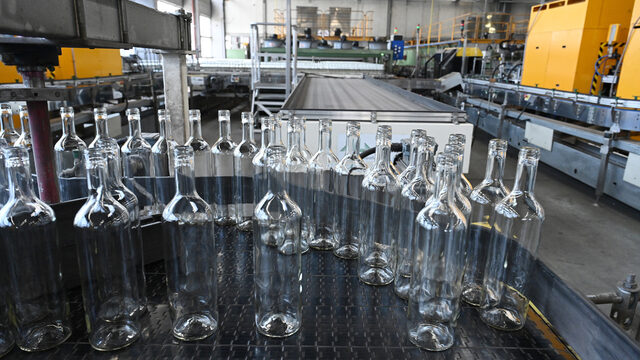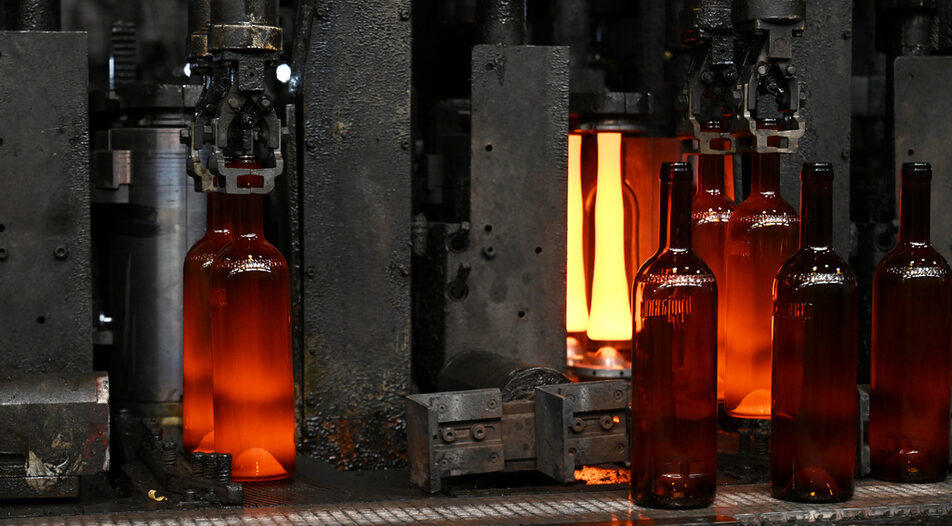For the last few years Bulgaria's Rubin glass maker has been carrying out a large-scale modernization program that has yielded its first results already. The capacity of the plant in the city of Pleven is now 67% larger and the replacement of old Russian technology has boosted efficiency by more than 60%. Rubin already has two new furnaces with a total capacity of 450 tonnes per day and improved flexibility to make different types of glass packaging. The construction of a third furnace is under way: it is planned to be put into operation next summer, adding 300 tonnes per day to the plant's capacity. The total investment in these projects exceeds 210 million levs (about 105 million euro) and the aim is to attract large Western customers. A fourth furnace is also in the plans.
In stages
The investment program was developed about six years ago, when the company, once part of the corporate empire of now bankrupt KTB bank, underwent a series of ownership changes. The first phase included the construction of a new German-technology furnace and revamping an existing building. Completed in 2019, the furnace is equipped with three lines for production of colored glass, mainly bottles.
An existing furnace was replaced during the second stage of the program. Its four lines manufacture colorless glass jars and bottles and their main advantage is flexibility. "We managed to configure our machines so that we can manufacture both big and small products," Georgi Paskov, CEO of plant operator Rubin Trading and of parent company and asset owner Glass Contribution told the Capital Weekly. The equipment also allows the production of shorter product series, which expands the customer base.
The third furnace currently under construction will have four production lines. According to Paskov, the project will considerably improve efficiency and quality. "Our idea is to show that Rubin, being a private independent company, can be up to the level of large Western groups that have much bigger volumes and revenues," he said. Construction is going according to plan and once the project is completed, Rubin will hire 130 new employees, increasing the number of staff to 550.

Basis for growth
The investment in the first two stages of the program exceeded 100 million levs and a furtherr 110 million levs is being invested in the third stage. The bulk of the financing has been provided as a loan by local Postbank, the rest is own funds of the company. The investment is expected to be repaid in five to six years.
"It is a crucial step for us, because investment is the only way for a company like ours, which is not part of an international group, to be able to attract large customers. That is an important basis for future growth," Paskov explained. Therefore the company's plans include the construction of a fourth furnace as the final stage of the investment program.
Rubin exports some 92% of its output, the main markets being countries in Western Europe and the top destination being Italy. In Paskov's words, the company is best known for its bottles for oils and wine.
In 2022 Rubins' revenues surged more than 2.5 times, exceeding 128 million levs. Net profit jumped from 500,000 levs in 2021 to 20.6 million levs. A part of the increase was due to higher prices of Rubin's products but there were also other factors. "We upgraded production to the standards of our Western partners and that helped us attract new customers," Paskov said. The plant has also expanded its portfolio with more complex products that have higher added value.
Another crucial reason for Rubin's growth last year was the war in Ukraine, where a major glass producer was hit and forced to shut down. Its customers switched to other manufacturers, almost filling Rubin's capacities.
Recession in Europe this year however is already felt on the market. "Inflation has obviously frightened consumers and that will inevitably affect the glass industry," Paskov said.
For the last few years Bulgaria's Rubin glass maker has been carrying out a large-scale modernization program that has yielded its first results already. The capacity of the plant in the city of Pleven is now 67% larger and the replacement of old Russian technology has boosted efficiency by more than 60%. Rubin already has two new furnaces with a total capacity of 450 tonnes per day and improved flexibility to make different types of glass packaging. The construction of a third furnace is under way: it is planned to be put into operation next summer, adding 300 tonnes per day to the plant's capacity. The total investment in these projects exceeds 210 million levs (about 105 million euro) and the aim is to attract large Western customers. A fourth furnace is also in the plans.












